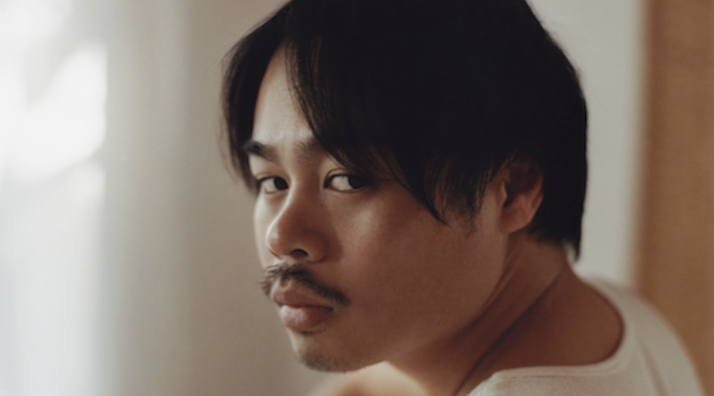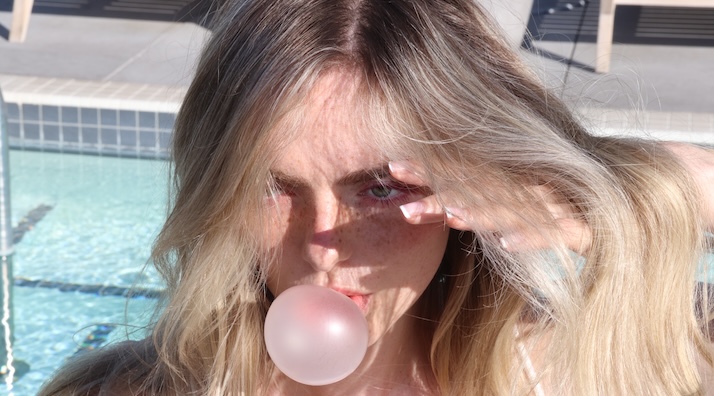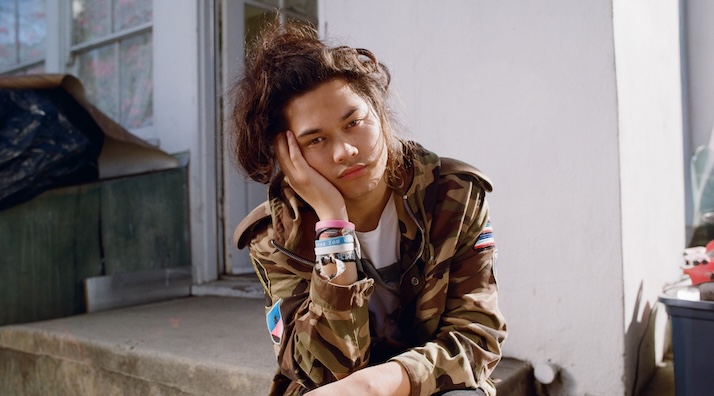Labit's "MANGOES AND RICE" Is the First of A Memoir of Change [Q&A]

For all the power family has in our lives, it's only occasionally do they impact songwriting as viscerally as Labit’s wondrously intimate, "MANGOES AND RICE." The track dives into childhood memories, its most prominent memory: desserts. Labit is a soulful throwback writer, a recovering Southern California rocker who pivoted into romantic, warm and sensual songs that feel like you are listening to the decadence of a sweet dish. He graced the office for a stunning performance celebrating AAPI month, and we stole some time with this incredible talent to dig into the recently released single – from identity and upbringing, to (of course) sweet, sticky foods:
OnesToWatch: Why are you an artist?
Labit: Why am I an artist? I think it really started in high school. I got cut from the JV volleyball team.
Ouch.
Really sucked. It was a blow to my ego, but at the same time, there was a battle of the bands happening in a few weeks, so I was like, all right, this is a sign. I started playing guitar around the same time and really fell in love with music in general. I grew up on a lot of pop punk, and then my dad introduced me to the Beatles and Michael Jackson. There were a lot of different genres of music always flowing around in my life. I was drawn to guitar as soon as I learned and that kicked things off for me.
Okay, so the question is, where are all those volleyball players now and look at you! What happened after Battle of the Bands got you hooked on music?
Right after high school, I was in a pop punk band for a bit, and got my first dose of touring in those days. We did U.S. and Canada, and I just fell in love with everything about the lifestyle and being exposed to music. I moved to LA a couple years after that, did songwriting for a bit as I stepped way from the artist stuff, and then started Labit in 2020. It’s been a journey, and just so cool to dive into new sounds. Obviously my stuff now is not very pop punk at all, but I’ve been having a lot of fun diving into new genres and finding the best way to tell each song’s story. That’s what I’ve learned through all of this: not to box myself in.
Where’d you move to LA from?
I grew up in San Diego.
Oh, not too far. And explains the pop punk thing, too. You mention songwriting, which, obviously, for any musician, is probably the most important thing. It’s the foundation for everything. What’s different now, in the San Diego scene?
I mean, pop punk songwriting is still there. It’s a little more rigid in the tropes, but that’s fun because it’s a part of the energy and expression of it.
What’s the biggest difference between the music you grew up doing and your music as Labit?
On a human level, I’ve just kind of chilled out from all of that, you know? Like, not losing my voice every show. But I think the biggest difference is in how I view my writing and what I want to write about. Back then I was so focused on proving myself and trying to come up with the coolest thing, and it was just a lot of energy. And I think recently I’ve realized that it's just a game, you know? I create music to figure things out in my life, and it's a therapy. Now, I really view it as a meditation. When I write a song, it’s for me, and then when it’s done, it’s for everybody else. So my viewpoint has changed.
The therapy aspect of songwriting is totally universal. What made songwriting become therapy for you?
I never went to therapy growing up or anything, so I found solace in that. Recently, though, the album I’m currently promoting is about my childhood and growing up Filipino in a very white neighborhood. So, it’s a lot of looking back and realizing why I am the way I am through uncomfortable and comfortable memories, the good and the bad. It’s been very helpful. I’ve been in that zone for more than a year as I was writing the album, and only now do I feel the weight coming off of my shoulders because of it. I can focus on the present and the future now.
That makes sense. What are some of the emotions you felt growing up?
I had a great group of friends, but I definitely was the token Filipino. I didn’t necessarily feel alienated, especially on purpose, but it wasn’t like I could look at a superhero and see myself in their face. So there’s just little things that, when I think about them now, I can see how it affected me, and the environmental factors. I was 13 years old, trying to find my identity and self-worth, while not having role models to look up to. There’s a major Asian and Filipino crowd in San Diego, but I didn’t quite fit in with them, but I also didn’t quite fit in with my friends just based on looks. So it was a little mind-boggling.
That’s definitely an isolating environment. From what I know of Filipino culture, there’s an amazing musical emphasis. Does any of your talent come from your family?
My family isn’t musical at all, but my sister is a dancer. My parents love art and music in general though. I think that was the big reason I gravitated toward the creative fields. I also have a cousin who’s in music and it was cool to see him succeed and think, “Oh, I can do that.” Conversations with my grandmother were very inspiring, too – her brother was a big classical guitar player. She would show me mixtapes of his playing, and as a teenager, of course, you brush it off, but thinking back now, it’s so cool. My album is named Sol, after my grandmother’s name Solita.
That’s beautiful. When you write music, especially an album, is it more a representation of a moment in time, or do your projects work in tandem and speak to each other?
With Sol, it’s a bit of both. It’s a long album, 18 tracks. I could have split it up in two, but I really wanted to “feel” when I was done writing, rather than cutting myself off at a certain point. So in that sense, there’s nothing within Sol that purposely leads towards a future project. There’s tinges of how the next album would sound, but I viewed this one as a release and catharsis and a weight that’s been lifted from finishing it.
How do you cut out songs from an 18 song album?
You don’t. But, I probably wrote at least double the songs before landing at this tracklist. I really wanted to capture all of the changes I’ve undergone in the last two years. I’m in my first very serious relationship, and compiling that with revisiting my childhood, family members, friend problems – I just really had a lot to say.
Are you good at self-editing? Can you leave things behind, creatively, or do you get stuck on them?
I learned throughout the process that I’m okay with deleting things and starting over. I wasn’t really trying to fit a certain vibe or genre, per se, so with each song, I was just focused on whatever that song needs for itself, to service it. Letting go of my ego to make the song the best it can be was a big lesson. The real talent of a songwriter is in what they leave out.
Is there a new project already in the works?
Yes, I’m in the writing stages again. I don’t know what it’s going to be, but I do have some collab coming out after the album that I’m excited about it. It’ll be a nice break after all of this music to breathe a bit, get inspired by other artists. I’m in a fun stage where I’m not putting any pressure on myself.
You said you started out in bands, so I can imagine you are somewhat used to writing with people, right? As a solo artist, does it feel different to collaborate?
In a weird way, I’m collaborating more now than I ever did in the band. We were all in high school back then, so it was mainly me writing the song and the other guys hanging out, in the best way possible. I actually still work with the same guitarist, he’s a big producer on my stuff. He goes by James From the Internet. We’ve known each other our entire lives, and now our collaboration is more Rick Rubin style. I know my strength, I know my weaknesses.
Pivoting to more fun questions. If you hit a writer’s block and need inspiration, what’s your routine?
I don’t force it. I’ve been raising a puppy for the last two years, he’s a Border Collie Shepherd. We got him at two months and he’s two years now, so I had him throughout the album writing process, and he was a good thing to focus on. But even now, whenever I hit a block, I focus on other things in life to keep that balance. When I was younger, I would be hard on myself when the ideas weren’t flowing. But now, it’s important to me to give energy to other aspects of life, because when I feel uninspired, it’s usually because I need to live more. I need to experience.
If you had to cook a bunch of food for friends, what would you whip up?
Mangoes in rice would be the clever answer, because of my song. Some great Asian desert, with ube. But in reality, I’d probably Postmates that shit. Maybe a charcuterie board… but the kind that looks fancy but is actually crackers from a tin and cut-up cheese.
If you could create a dream lineup – any venue, artist, place, time – what would that look like?
I would be playing with Bon Iver. The way he approaches art is just so sick. Jon Bellion, too, and John Mayer. When I first started listening to John Mayer, I was drawn to his guitar, but now I really appreciate his evolution. It’s cool to see someone go through so many phases of musical growth and be unapologetic about it.
If you could take a fan and put them in the perfect place to listen to this 18 track album dedicated to your grandmother, where would they be, what would they be doing?
Definitely a solo roadtrip where they listen to the album all the way through. Get a little sunrise in there if you’re crazy. Although “Sol” is my grandmother, it’s also the sun, and solitude, and I feel like it speaks for the entire album through that one word.
Last question. At OnesToWatch, we love when artists put us on to their favorite artists. Who are you listening to right now?
Wyatt Woodley is from the Bay, I met him through a friend, and he is so good. He produces, mixes, and writes all of his stuff, and I can’t really put his artistry into one genre. It’s really cool.
Any parting words, advice, drama you need to spill?
Oh, man. No drama, thankfully. Go get some mangoes and rice.


![Mandy Lee of MisterWives Enters A New Era [Q&A]](https://s3-us-west-2.amazonaws.com/onestowatch-v2/unnamed-1770760073.jpg)
